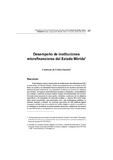| dc.rights.license | http://creativecommons.org/licenses/by-nc-sa/3.0/ve/ | |
| dc.contributor.author | Contreras, Ismaira | |
| dc.date.accessioned | 2010-11-16T19:55:17Z | |
| dc.date.available | 2010-11-16T19:55:17Z | |
| dc.date.issued | 2009-08-31 | |
| dc.identifier.issn | 0798-3069 | |
| dc.identifier.uri | http://www.saber.ula.ve/handle/123456789/31878 | |
| dc.description.abstract | Este trabajo evalúa el desempeño de instituciones microfinancieras (IMF)
no bancarias, del Estado Mérida, desde una perspectiva de un modelo de IMF
ideal, en cuanto a su orientación hacia la atención de los sectores excluidos del
sistema bancario tradicional, con capacidad de ofrecer un servicio de calidad a
sus clientes, de lograr la autosuficiencia operativa y financiera, sustentabilidad
en el tiempo y atención al mayor número posible de demandantes del servicio.
Se realizó una encuesta de once partes, referidas a cada uno de los objetivos
específicos y 60 preguntas de selección múltiple, a catorce IMF, entre ellas,
siete casas comerciales, una asociación civil y seis instituciones públicas de
carácter nacional y estadal. Se concluye que todas las IMF públicas siguen
otorgando créditos bajo la modalidad de crédito dirigido o crédito a la pobreza y
no mediante la modalidad de intermediación financiera, alejándose del modelo
de una IMF ideal; se exceptúan las casas comerciales por tener características
particulares de negocio privado, y las cajas rurales cuyo modelo de gestión se
vislumbra sustentable en el tiempo. | es_VE |
| dc.language.iso | es | es_VE |
| dc.publisher | SABER ULA | es_VE |
| dc.rights | info:eu-repo/semantics/openAccess | |
| dc.subject | Microfinanzas | es_VE |
| dc.subject | Desempeño | es_VE |
| dc.subject | Sustentabilidad operativa | es_VE |
| dc.subject | Financiera | es_VE |
| dc.title | Desempeño de instituciones microfinancieras del Estado Mérida | es_VE |
| dc.title.alternative | The performance of microfinancial institutions of Mérida state | es_VE |
| dc.type | info:eu-repo/semantics/article | |
| dc.description.abstract1 | This paper evaluates the performance of non-bank Microfinance
Institutions (MFIs), located in Mérida State, since a ideal MFIs model approach,
referred to its orientation toward the attention of the excluded sectors of the
traditional banking system, able to offer a quality service to its clients, to achieve
the operative and financial self-sufficiency, sustainability and to attend the major
quantity of services demanders. It was carried out a survey constituted by eleven
parts; each one referred to the specific objectives and 60 multiple selection
questions, to fourteen MFIs – among them, seven commercial houses, a civil
association and six public institutions of national and estate-level. It is concluded
that all the public MFIs continues granting credits under the modality of directed
credit or credit for poverty alleviation and not through financial intermediation,
contradicting the ideal MFIs pattern; exceptions of these circumstances are the
commercial houses because of its private business peculiar characteristics, and
the Community Rural Boxes whose management model is glimpsed sustainable
over time. | es_VE |
| dc.description.colacion | 287-307 | es_VE |
| dc.description.email | ismaira@ula.ve | es_VE |
| dc.description.frecuencia | trimestral | |
| dc.identifier.depositolegal | 1991102ME302 | |
| dc.publisher.pais | Venezuela | es_VE |
| dc.subject.centroinvestigacion | Centro de Investigaciones en Ciencias Humanas (HUMANIC) | |
| dc.subject.facultad | Facultad de Humanidades y Educación | es_VE |
| dc.subject.keywords | Microfinances | es_VE |
| dc.subject.keywords | Performance | es_VE |
| dc.subject.keywords | Operative | es_VE |
| dc.subject.keywords | Financial sustainability | es_VE |
| dc.subject.publicacionelectronica | Revista Fermentum | |
| dc.subject.seccion | Revista Fermentum: Dossier | es_VE |
| dc.subject.thematiccategory | Artes y Humanidades | es_VE |
| dc.subject.tipo | Revistas | es_VE |
| dc.type.media | Texto | es_VE |


